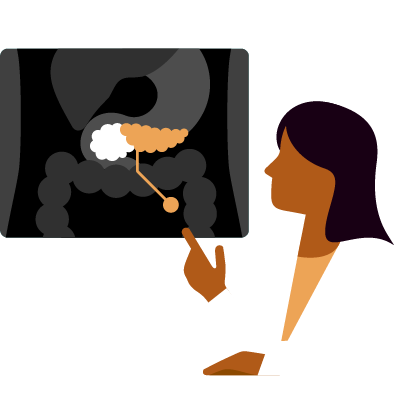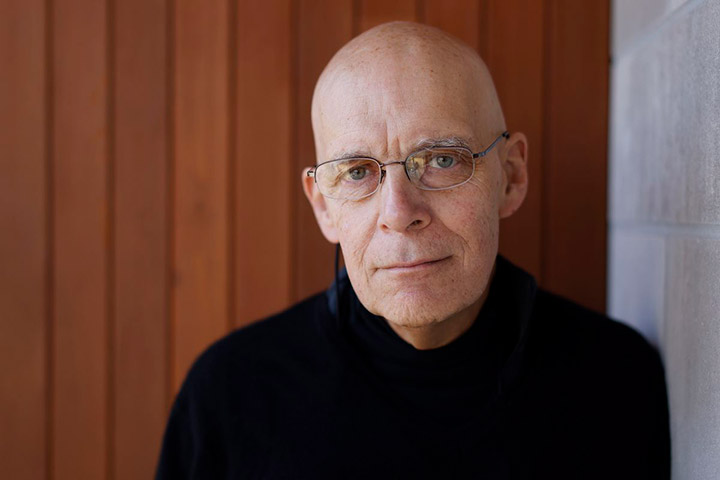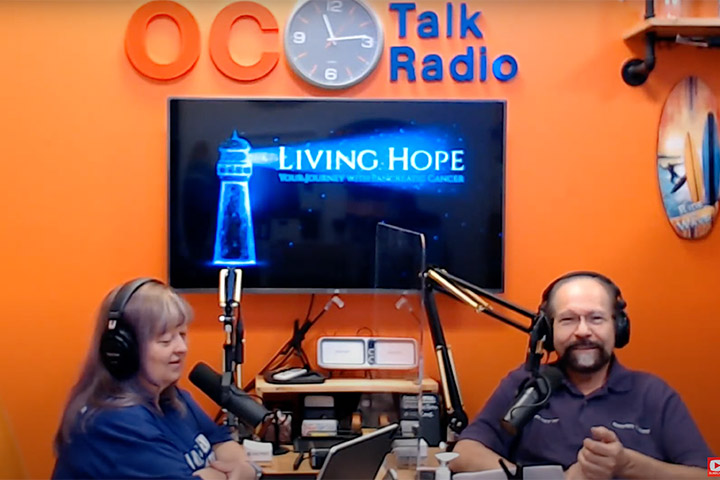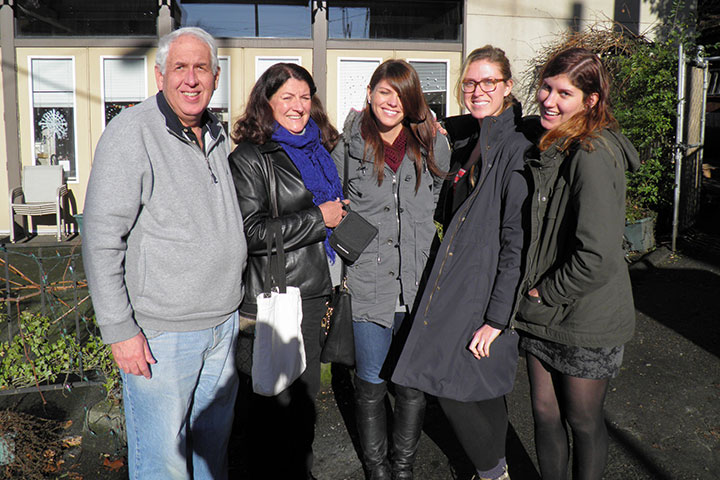My Eight-Year Un-Celebration of Surviving Pancreatic Cancer
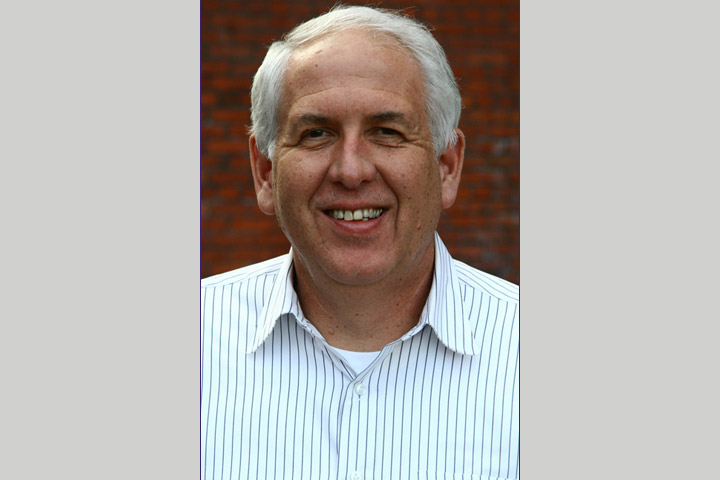
It’s hard for me to celebrate surviving pancreatic cancer when so many don’t get to.
This past January marked eight years. I wish I could say I did something special, or got some magic elixir, but, sadly, neither is true. The truth is I have nothing to thank but dumb luck.
I had the standard treatment—a brutal Whipple procedure, followed by thirty radiation sessions spread over six weeks (I got weekends off for good behavior). During those six weeks, I had my BFF, a chemo pump, with me 24/7, dosing me with 5-FU. (Despite the nurse’s stern warnings, every four or five days, or once I became ripe enough, I hung the pump outside the shower, double-taped down my port, jumped in, and soaped down and rinsed off.) This was followed by six hefty doses of Gemzar every other week. Like I said, nothing special.
From what I’ve since learned, the surgeon who did my Whipple procedure to extract the one-inch pancreatic tumor sucked up next to my bile duct was one of the most experienced near me. But even in this, I had nothing to do with selecting him. Towards the end of my first of many hospital stays, a hospitalist (hospital doctor) felt sorry for me and called him and asked him to come by to see me.
My Journey
So how did this all begin? After turning yellow, I had an emergency CT scan which showed I had a blocked bile duct. I landed in the hospital , where they stented me to open it up. Unbeknownst to me, a scraping was taken. Three days later, the doctor who stented me stopped by to inform me, “I’m so sorry, you have a malignancy.” Before I could muster a single question, he turned and walked out. I was devasted both by the news and by the fact that not even a doctor used the C word. Thus, my journey began.
Only post-Whipple did a pathology report reveal I was stage IIB, with thankfully only one positive lymph node. Later I learned that had I not turned yellow and gotten to the hospital pronto I would not be writing this. Again, dumb luck. Or perhaps angels do exist.
Given the bleak survival rate for pancreatic cancer, something that has improved little despite years of countless deaths, I did toy with participating in a trial, but on the advice of my medical oncologist, aka chemo doc, I quickly abandoned that idea. Had she signed off on it, I would have done it.
What I Recommend
So what would I offer to someone who has recently gotten the horrific news they have pancreatic cancer, or those who are hoping it is behind them like me?
Trust our doctors.
OK, I’m a data guy. Before buying anything, I check dozens—no, hundreds—of online reviews. But being so sick, I had no choice but to fall eyes wide open into the medical abyss and trust it would catch me. There was no time to research who might be the best pancreatic cancer specialist and then try to snag an appointment. Most days I was lucky to get out of bed and down to my recliner, thus the idea of traveling to one of the cancer meccas like Fred Hutchinson or the famed Mayo Clinic was out of the question. I had no choice but to trust my doctors. Trust your doctors.
Do what our doctors ask us to do. Period. With a caveat.
During the treatment process, you will be told things that don’t make much sense, as I was. But unless you plan to get a medical license and then years of oncology training in the space of a couple of months, you have little choice but to do what your doctors tell you to do. Period. But with this comes an important caveat. If you don’t understand what you are being asked to do, or why, ask questions until you get an answer that makes sense. The hard part is realizing that if your doctor doesn’t want to answer these questions, it’s time to find another one–and fast. Every minute counts in cancer treatments. There is no time to waste. The good news is that I’ve found when I ask respectful questions showing I really want to know, I more often than not get great answers. Do what your doctors tell you to do. Period. But ask questions.
Exercise even just a little bit.
Even amid COVID, I kept on going to the gym three or four times a week. Nothing special. I spent 30 minutes on a reclined bike and used three or four weight machines to keep my upper body strength from going in the ditch.
I got two things out of this. First, it helped me stay healthy. In cancer survivor terms, no evidence of disease. This is not to mention keeping my blood sugar levels from climbing so high they could make a moon landing (a side effect of my Whipple taking the top third of my pancreas). Second, and likely more important, it has helped me feel alive. For those of you who like to walk, get out there. Walk around your neighborhood. Connect with your neighbors and their dogs. I used to walk a lot but now with three compressed vertebrae, thanks to my abdominal radiation, walking distances isn’t an option for me. Exercise even just a little bit.
Don’t ever give up hope. Ever.
Yes, this is certainly a battle cry for us cancer survivors, but let’s face it: As hard as it is to get through our treatments, the real battle begins after the last trip to the chemo room or the radiation vault. While I was in treatment, I felt like I was engaged in beating my cancer. But after, I felt cut loose, on my own, me against my cancer. Yes, I still have those peek-through-the-cracks-in-my-fingers follow-up appointments with my oncologist, but other than those, day in and day out I have to manage my inner life and try to stay positive while not worrying about things I have no control over. If my cancer comes back, it’s coming back. There is little I can do but hope for the best. Live today. Tomorrow will take care of itself. Don’t ever give up hope. Ever.
Having been through the pancreatic cancer gauntlet and lived to talk about it, my heart goes out to those just entering it and those who are wondering, like me, what’s next? But I think if you will do what your doctors tell you to do while asking questions, exercise even just a little bit, and not give up hope, you will, like me, get through it.
William Ramshaw lives in the expansive Pacific Northwest. He is an eight-year survivor of pancreatic cancer and has written a memoir, Gut Punched! Facing Pancreatic Cancer. He shared his treatment story in “Chicken Enchiladas and Pancreatic Cancer.”



